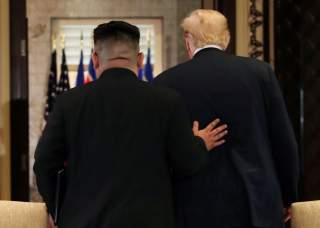North Korea and America’s Second Summit: Here’s What James Holmes Thinks Will Happen
"Kim Jong-un sees doomsday weaponry as insurance against an Iraqi, Libyan, or Syrian future."
Editor’s Note: Want more ideas on what will happen at the summit? Check out all 76 expert opinions we gathered here.
A peace denuclearization and a formal end to the Korean War are two separate matters, and the latter is more soluble than the former. Indeed, Pyongyang and Seoul have already undertaken halting diplomacy aimed at ending the seventy years’ war. The impediments to dismantling the North Korean nuclear complex are far more imposing. They involve survival, the most basic imperative for any human being or institution. Some barriers are domestic. It’s hard for any political leader—especially an authoritarian ruler like Kim Jong-un whose legitimacy hinges on a reputation for toughness and resolve—to back away from vital interests under duress and amid the glare of publicity. Nuclear weapons constitute one such interest.
This is Negotiations Theory 101. Make a public commitment and you stake your personal prestige on keeping it. Fail to keep it and you look weak and vacillating in the eyes of your constituents. Look frail and you may embolden them to overthrow you. Shirking commitments, then, spells danger for any tyrant eyeing oppressed masses.
Other barriers to disarmament stem from outside North Korea. Surveying recent history reveals what befalls despots who lack mass-destruction weapons, or who possess them but agree to disarm in the cause of nonproliferation. They have little recourse once the United States and its allies decide to depose them or invade their countries. Saddam Hussein never fielded a nuclear deterrent. Hussein met an ill fate. Muammar Gaddafi agreed to forego unconventional arms. Western allies casually swatted aside his regime. Gaddafi too suffered a gruesome death. Bashar al-Assad possessed no deterrent to dissuade outsiders from intervening in the Syrian civil war. Assad lives, but he presides over ruins.
Kim Jong-un sees doomsday weaponry as insurance against an Iraqi, Libyan, or Syrian future. His regime’s survival is at stake, not to mention his own personal longevity. The prospect of being ousted from power, butchered, or both concentrates the mind. Now, summitry might convince Pyongyang to postpone new nuclear or ballistic-missile tests. Persuading Kim to accept a pause in his nuclear buildup would represent a worthy achievement for President Donald Trump. Every day Kim wakes up and decides not to test Washington’s and Seoul’s patience is a day when good things could happen. String together enough such days and tensions on the Korean Peninsula might abate.
But expecting the North Korean strongman to barter away the ultimate guarantee of his rule and his life stretches credulity beyond its breaking point.
James Holmes is J. C. Wylie Chair of Maritime Strategy at the Naval War College. The views voiced here are his alone.
Image: Reuters


